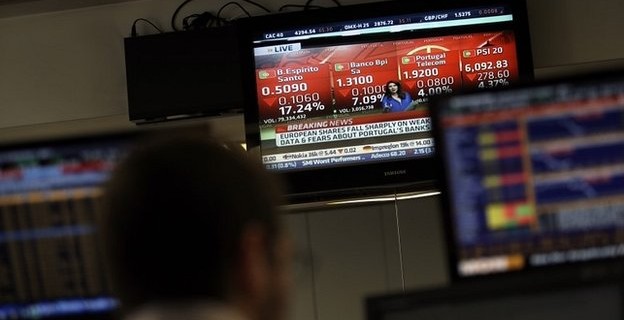Global stock markets hit by Portuguese bank concerns

Stock markets in Europe and the US have fallen over concerns about the health of one of Portugal’s biggest banks.
Shares in Banco Espirito Santo were suspended after falling 17% following concerns about accounting irregularities at its parent group.
As a result, the Lisbon stock exchange fell more than 4%, Madrid’s IBEX was down 2.7%, while the Paris Cac 40 and Frankfurt’s Dax were both 1.8% lower.
Wall Street also opened sharply lower, with the Dow Jones falling 150 points.
This took the index well below 17,000, the level breached for the first time earlier this month.
Media reports highlighting concerns about certain financial practices at the Espirito Santo group surfaced at the end of last year.
Portugal’s central bank then ordered an audit into the group’s accounts, which uncovered “serious” accounting irregularities.
The Portuguese government has said that Banco Espirito is isolated from problems at its parent, which is registered in Luxembourg, and that public finances are not at risk.
Renewed concerns
“This Espirito Santo case has been simmering for some time, but is clearly now bursting out into the open and is obviously a troubling development for a country that has just exited its bailout programme,” said Nicholas Spiro, head of Spiro Sovereign Strategy in London.
At the height of the financial crisis, Portugal was forced to take a 78bn euro ($106bn; £62bn) bailout from its European partners and the International Monetary Fund.
Portugal exited the bailout programme last month as confidence in the country’s economy returned.
Government borrowing costs fell to an eight-year low of 3.58% in April this year, but renewed concerns about the health of the country’s financial sector pushed these back up towards 4% on Thursday.
Some commentators suggested the specific concerns about Banco Espirito fed into wider fears about the health of the eurozone economy.
“What really hurts shares today… are worries that the economic recovery in the eurozone might be already weakening again,” said Markus Huber at Peregrine and Falcon.
“Latest economic data out of Germany and also today from France and Italy are clearly seeming to point this way.”
On Thursday, France reported that factory output in May declined by its steepest level in nearly two years, down 2.3% from the month before. Italy also reported a similarly disappointing decline, with industrial output falling by 1.2% in May.
In more bad news, both exports and imports in Germany fell in May, indicating a slowdown in economic activity.
Exports declined by 1.1% and imports were down 3.4% – the sharpest decline since November 2012.
Source: bbc




























